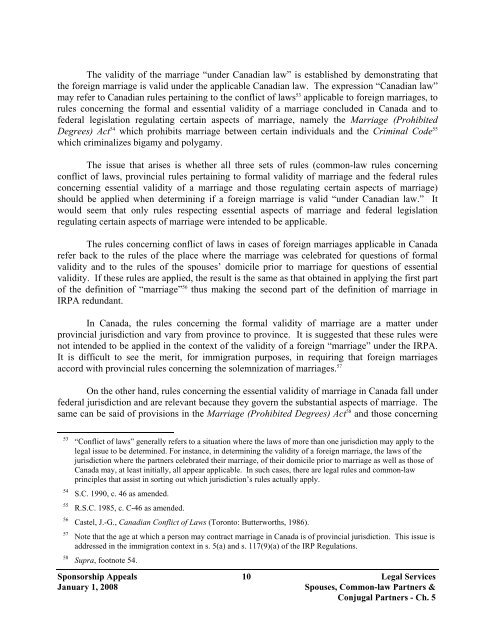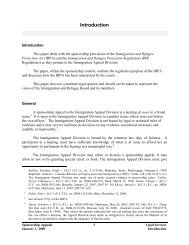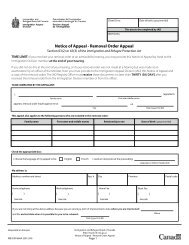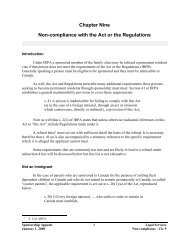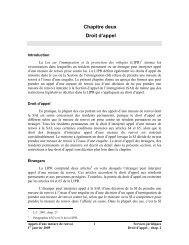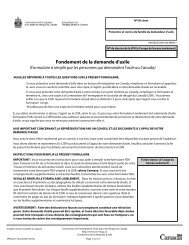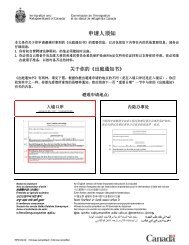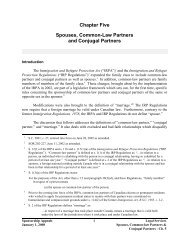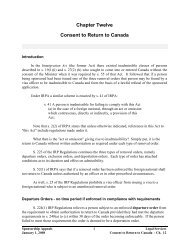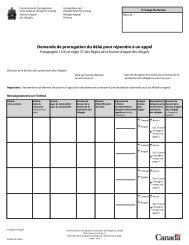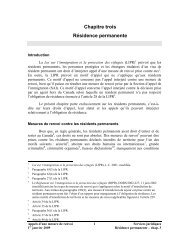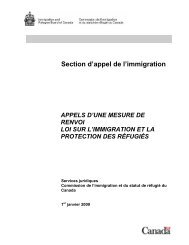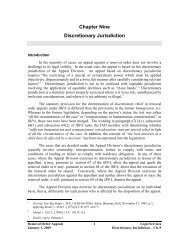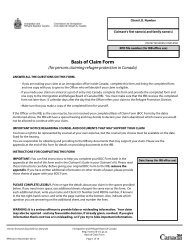Sponsorship Appeals - Immigration and Refugee Board of Canada
Sponsorship Appeals - Immigration and Refugee Board of Canada
Sponsorship Appeals - Immigration and Refugee Board of Canada
You also want an ePaper? Increase the reach of your titles
YUMPU automatically turns print PDFs into web optimized ePapers that Google loves.
The validity <strong>of</strong> the marriage “under Canadian law” is established by demonstrating that<br />
the foreign marriage is valid under the applicable Canadian law. The expression “Canadian law”<br />
may refer to Canadian rules pertaining to the conflict <strong>of</strong> laws 53 applicable to foreign marriages, to<br />
rules concerning the formal <strong>and</strong> essential validity <strong>of</strong> a marriage concluded in <strong>Canada</strong> <strong>and</strong> to<br />
federal legislation regulating certain aspects <strong>of</strong> marriage, namely the Marriage (Prohibited<br />
Degrees) Act 54 which prohibits marriage between certain individuals <strong>and</strong> the Criminal Code 55<br />
which criminalizes bigamy <strong>and</strong> polygamy.<br />
The issue that arises is whether all three sets <strong>of</strong> rules (common-law rules concerning<br />
conflict <strong>of</strong> laws, provincial rules pertaining to formal validity <strong>of</strong> marriage <strong>and</strong> the federal rules<br />
concerning essential validity <strong>of</strong> a marriage <strong>and</strong> those regulating certain aspects <strong>of</strong> marriage)<br />
should be applied when determining if a foreign marriage is valid “under Canadian law.” It<br />
would seem that only rules respecting essential aspects <strong>of</strong> marriage <strong>and</strong> federal legislation<br />
regulating certain aspects <strong>of</strong> marriage were intended to be applicable.<br />
The rules concerning conflict <strong>of</strong> laws in cases <strong>of</strong> foreign marriages applicable in <strong>Canada</strong><br />
refer back to the rules <strong>of</strong> the place where the marriage was celebrated for questions <strong>of</strong> formal<br />
validity <strong>and</strong> to the rules <strong>of</strong> the spouses’ domicile prior to marriage for questions <strong>of</strong> essential<br />
validity. If these rules are applied, the result is the same as that obtained in applying the first part<br />
<strong>of</strong> the definition <strong>of</strong> “marriage” 56 thus making the second part <strong>of</strong> the definition <strong>of</strong> marriage in<br />
IRPA redundant.<br />
In <strong>Canada</strong>, the rules concerning the formal validity <strong>of</strong> marriage are a matter under<br />
provincial jurisdiction <strong>and</strong> vary from province to province. It is suggested that these rules were<br />
not intended to be applied in the context <strong>of</strong> the validity <strong>of</strong> a foreign “marriage” under the IRPA.<br />
It is difficult to see the merit, for immigration purposes, in requiring that foreign marriages<br />
accord with provincial rules concerning the solemnization <strong>of</strong> marriages. 57<br />
On the other h<strong>and</strong>, rules concerning the essential validity <strong>of</strong> marriage in <strong>Canada</strong> fall under<br />
federal jurisdiction <strong>and</strong> are relevant because they govern the substantial aspects <strong>of</strong> marriage. The<br />
same can be said <strong>of</strong> provisions in the Marriage (Prohibited Degrees) Act 58 <strong>and</strong> those concerning<br />
53<br />
54<br />
55<br />
56<br />
57<br />
58<br />
“Conflict <strong>of</strong> laws” generally refers to a situation where the laws <strong>of</strong> more than one jurisdiction may apply to the<br />
legal issue to be determined. For instance, in determining the validity <strong>of</strong> a foreign marriage, the laws <strong>of</strong> the<br />
jurisdiction where the partners celebrated their marriage, <strong>of</strong> their domicile prior to marriage as well as those <strong>of</strong><br />
<strong>Canada</strong> may, at least initially, all appear applicable. In such cases, there are legal rules <strong>and</strong> common-law<br />
principles that assist in sorting out which jurisdiction’s rules actually apply.<br />
S.C. 1990, c. 46 as amended.<br />
R.S.C. 1985, c. C-46 as amended.<br />
Castel, J.-G., Canadian Conflict <strong>of</strong> Laws (Toronto: Butterworths, 1986).<br />
Note that the age at which a person may contract marriage in <strong>Canada</strong> is <strong>of</strong> provincial jurisdiction. This issue is<br />
addressed in the immigration context in s. 5(a) <strong>and</strong> s. 117(9)(a) <strong>of</strong> the IRP Regulations.<br />
Supra, footnote 54.<br />
<strong>Sponsorship</strong> <strong>Appeals</strong> 10 Legal Services<br />
January 1, 2008<br />
Spouses, Common-law Partners &<br />
Conjugal Partners - Ch. 5


